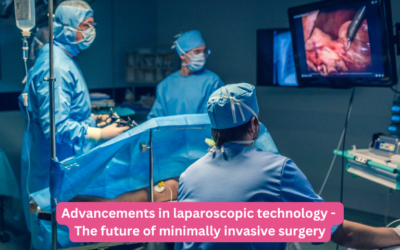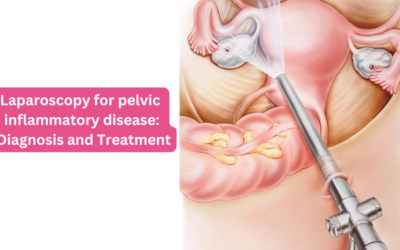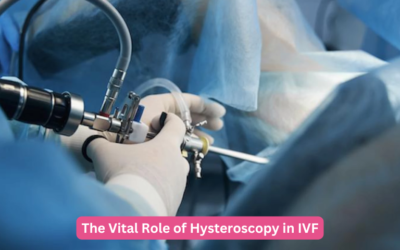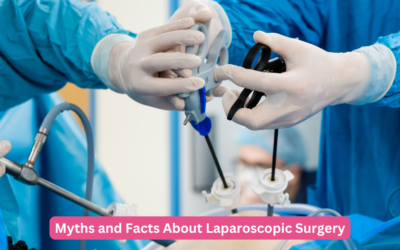Preparing for laparoscopic surgery involves several important steps to ensure a smooth and successful procedure. At Shukan Hospital and IVF Center, our team of laparoscopic experts is committed to providing comprehensive care, from pre-operative preparation to post-operative recovery. This detailed guide explores essential tips and guidelines to help you prepare effectively for laparoscopic surgery, enhancing your overall experience and outcome.
Understanding Laparoscopic Surgery
Laparoscopic surgery, also known as minimally invasive surgery, uses small incisions and specialized instruments to perform surgical procedures. This technique offers significant benefits over traditional open surgery, including faster recovery times, reduced pain, and minimal scarring. Common laparoscopic procedures include hysterectomy, myomectomy, ovarian cystectomy, and treatment of endometriosis.
The Consultation and Preoperative Assessment
1. Initial Consultation:
- Tip: Schedule a consultation with your surgeon at Shukan Hospital and IVF Center well in advance of your surgery date.
- Guideline: During this appointment, your surgeon will review your medical history, perform a physical examination, and discuss the procedure in detail. This is also the time to ask any questions you may have about the surgery or recovery process.
2. Medical History Review:
- Tip: Be prepared to provide a comprehensive medical history, including any previous surgeries, chronic conditions, allergies, and medications.
- Guideline: Your surgeon will use this information to evaluate your suitability for laparoscopic surgery and to develop a personalized surgical plan.
3. Preoperative Testing:
- Tip: Complete all necessary preoperative tests as recommended by your healthcare team.
- Guideline: Common tests may include blood tests, electrocardiograms (ECG), imaging studies, and any other tests relevant to your specific condition. These tests help ensure you are in optimal health for surgery.
Following Preoperative Instructions
1. Fasting Guidelines:
- Tip: Adhere to fasting instructions provided by your healthcare team, typically requiring you to refrain from eating or drinking for a specified period before surgery.
- Guideline: Fasting helps reduce the risk of complications during anesthesia. Clear fluids may be allowed up to a certain point, but solid foods and beverages should be avoided as instructed.
2. Medication Management:
- Tip: Discuss your current medications with your surgeon, including prescription drugs, over-the-counter medications, and supplements.
- Guideline: Certain medications may need to be adjusted or temporarily discontinued before surgery. Your healthcare team will provide specific instructions based on your medical history.
3. Preoperative Hygiene:
- Tip: Follow any preoperative hygiene instructions, such as showering with an antibacterial soap the night before and the morning of surgery.
- Guideline: Proper hygiene helps reduce the risk of infection. Avoid applying lotions, perfumes, or makeup on the day of surgery.
Arranging Transportation and Support
1. Transportation:
- Tip: Arrange for transportation to and from Shukan Hospital and IVF Center on the day of surgery.
- Guideline: You will not be able to drive yourself home after surgery due to the effects of anesthesia. Ensure you have a reliable friend or family member to assist you.
2. Home Support:
- Tip: Plan for support at home during the initial recovery period.
- Guideline: Having someone available to help with daily activities, such as cooking, cleaning, and childcare, can significantly ease your recovery. Inform your support person about your post-surgery needs and expected recovery timeline.
Preparing Your Home for Recovery
1. Comfortable Environment:
- Tip: Make your home comfortable and conducive to recovery before your surgery.
- Guideline: Create a resting area with pillows, blankets, and a comfortable chair or bed. Ensure essential items are within easy reach to minimize movement and strain during the initial recovery period.
2. Stock Up on Supplies:
- Tip: Stock up on essential items such as groceries, medications, and comfortable clothing.
- Guideline: Prepare easy-to-digest, nutritious meals and snacks. Fill any prescriptions in advance to have necessary medications on hand post-surgery.
3. Minimize Physical Exertion:
- Tip: Arrange your living space to minimize the need for bending, stretching, or lifting during the early stages of recovery.
- Guideline: Place frequently used items at waist level, clear pathways to avoid tripping hazards, and set up a recovery area on the main floor if your home has multiple levels.
Maintaining a Healthy Lifestyle
1. Balanced Diet:
- Tip: Follow a balanced diet rich in vitamins, minerals, and protein to support healing and recovery.
- Guideline: Focus on whole foods such as fruits, vegetables, lean proteins, and whole grains. Stay hydrated by drinking plenty of water.
2. Physical Activity:
- Tip: Stay physically active as recommended by your healthcare provider.
- Guideline: Engage in light exercises, such as walking, to maintain fitness and promote circulation. Avoid strenuous activities that could strain your body before surgery.
3. Avoid Smoking and Alcohol:
- Tip: Avoid smoking and excessive alcohol consumption, which can interfere with anesthesia and recovery.
- Guideline: Smoking cessation is particularly important, as it can impair wound healing and increase the risk of complications. Discuss smoking cessation programs with your healthcare provider if needed.
Addressing Emotional and Psychological Needs
1. Managing Anxiety:
- Tip: It’s normal to feel anxious or stressed before surgery.
- Guideline: Talk to your healthcare team about any concerns or fears you may have. They can provide reassurance and support, and may recommend relaxation techniques or counseling services if needed.
2. Support Network:
- Tip: Lean on your support network of family and friends for emotional support.
- Guideline: Share your feelings and concerns with loved ones. Having a strong support system can help alleviate anxiety and provide comfort leading up to your surgery.
3. Relaxation Techniques:
- Tip: Practice relaxation techniques such as deep breathing, meditation, or gentle yoga to manage stress.
- Guideline: These techniques can help calm your mind and body, promoting a sense of well-being and readiness for surgery.
Understanding Postoperative Care
1. Postoperative Instructions:
- Tip: Familiarize yourself with postoperative care instructions before surgery.
- Guideline: This may include information on wound care, activity restrictions, medications, and follow-up appointments. Knowing what to expect can help you prepare mentally and physically for the recovery process.
2. Pain Management:
- Tip: Follow your healthcare provider’s recommendations for pain management.
- Guideline: Take prescribed pain medications as directed, and use
non-pharmacological methods such as ice packs and rest to manage discomfort.
3. Activity Restrictions:
- Tip: Adhere to activity restrictions to promote healing and prevent complications.
- Guideline: Avoid heavy lifting, strenuous exercise, and other activities that could strain your body. Gradually resume normal activities as advised by your healthcare provider.
Expertise at Shukan Hospital and IVF Center
At Shukan Hospital and IVF Center, our laparoscopic experts are dedicated to providing personalized care and ensuring a positive surgical experience for every patient. From thorough preoperative preparation to attentive postoperative care, we strive to achieve optimal outcomes and patient satisfaction. Our multidisciplinary team is committed to your health and well-being throughout every stage of your surgical journey.
Conclusion
Preparing for laparoscopic surgery is crucial for ensuring a successful procedure and smooth recovery. At Shukan Hospital and IVF Center, we prioritize thorough preoperative preparation to enhance patient outcomes. Our expert team of laparoscopic specialists is committed to providing personalized care, from initial consultation to postoperative support. By following these guidelines and working closely with our healthcare team, you can optimize your surgical experience and achieve the best possible results.
Author Bio
Dr.Prakash Patel
He is a highly respected Infertility and IVF Specialist with an extensive medical career spanning over two decades. As the Director of Shukan Hospital & IVF Centre, he has dedicated his life to helping couples achieve their dreams of parenthood. He is renowned for his expertise in advanced laparoscopic surgeries and has successfully managed numerous complex cases involving recurrent miscarriages and recurrent IVF failures. His proficiency in high-risk pregnancy management and advanced IVF treatments makes him a trusted name in the field of reproductive medicine.
His approach to patient care is deeply compassionate, combining his vast clinical knowledge with a commitment to personalized treatment. He holds prestigious certifications from leading medical institutions in France and Croatia, reflecting his dedication to staying at the forefront of medical advancements. With memberships in notable organizations like FOGSI and ISAR, He is recognized both nationally and internationally for his contributions to gynecology and reproductive health.
Under his leadership, Shukan Hospital & IVF Centre has become one of the premier fertility centers in Gujarat, known for its state-of-the-art facilities and patient-centered care. His outstanding work has earned him several accolades, including the My FM Achiever Award, further cementing his reputation as a leading specialist in his field.
FAqs
How should I prepare for laparoscopic surgery?
Prepare for laparoscopic surgery by following your surgeon’s preoperative instructions, including fasting guidelines, medications, and arrangements for transportation and support at home.
What should I bring to the hospital on the day of surgery?
Bring any necessary paperwork, insurance information, identification, and comfortable clothing to wear after surgery. Leave valuables and jewelry at home.
How long does it take to recover from laparoscopic surgery?
Recovery times vary depending on the procedure and individual factors. Most patients can resume normal activities within a few days to weeks after laparoscopic surgery.
Are there dietary restrictions before laparoscopic surgery?
Your surgeon may advise you to fast (not eat or drink) for a certain period before surgery to reduce the risk of complications. Follow these guidelines closely.
Will I experience pain after laparoscopic surgery?
Some discomfort is normal after surgery, but your healthcare team will provide pain management options to keep you comfortable during the recovery process.
How can I manage anxiety before surgery?
Managing anxiety before surgery can involve talking to your healthcare team about your concerns, practicing relaxation techniques, and leaning on your support network of family and friends for emotional support.
What should I do if I have questions or concerns before surgery?
Contact your healthcare provider with any questions or concerns. It’s important to feel informed and reassured before your procedure.
How can I prepare my home for recovery?
Prepare your home by creating a comfortable resting area, stocking up on essential supplies, and arranging your living space to minimize physical exertion during recovery.
Can I take my regular medications before surgery?
Discuss your current medications with your surgeon. Certain medications may need to be adjusted or temporarily discontinued before surgery. Follow your surgeon’s instructions carefully.
Blogs related to Laparoscopy
Advancements in laparoscopic technology – The future of minimally invasive surgery
At the intersection of innovation and medicine, laparoscopic surgery has evolved from a promising technique into the gold standard of minimally...
Laparoscopy for pelvic inflammatory disease: Diagnosis and Treatment
Pelvic Inflammatory Disease (PID) is a serious infection of the female reproductive organs, including the uterus, fallopian tubes, and ovaries. Left...
The role of hysteroscopy in diagnosing and treating uterine abnormalities
At Shukan Hospital and IVF Centre, we are committed to providing comprehensive care for women’s reproductive health. One of the essential tools in...
The Wonder of Laparoscopy Surgery and its Benefits
Laparoscopy surgery, also known as minimally invasive surgery, has significantly transformed the landscape of modern medicine, particularly in the...
The Vital Role of Hysteroscopy in IVF
In the journey toward a successful in vitro fertilization (IVF) outcome, every step is crucial in ensuring the best possible results. One of the...
Myths and Facts About Laparoscopic Surgery
Laparoscopic surgery has become a popular choice for many types of operations due to its minimally invasive nature. However, several myths still...







